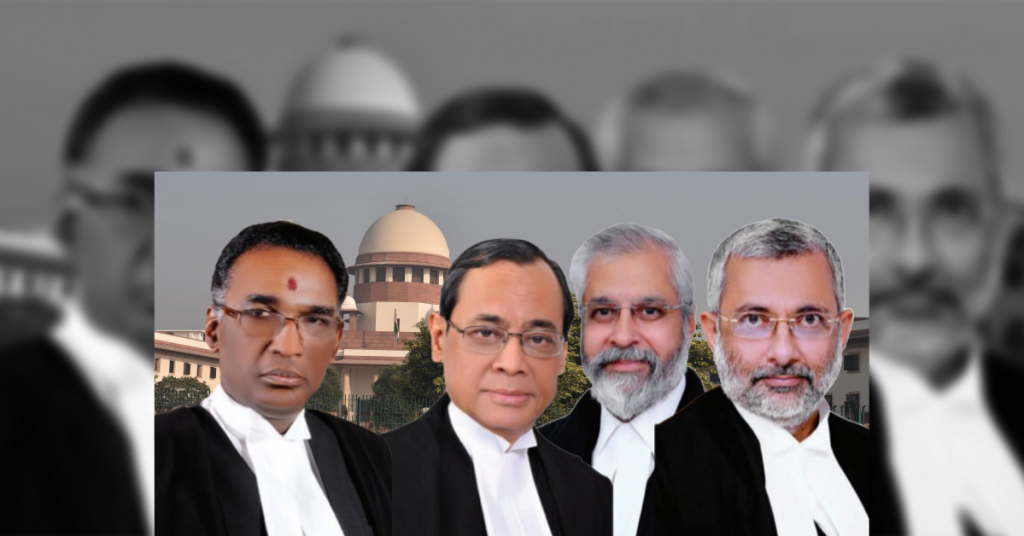Four of the five senior most judges in the Supreme Court –five of whom constitute its Collegium—have in an unprecedented move-challenged the CJI for alleged nepotism in assigning cases to pre-chosen benches in a press conference held in New Delhi.
Four of the five senior most judges of the Supreme Court – Justices J Chelameswar, Ranjan Gogoi, Madan Lokur and Kurian Joseph – in a letter to Chief Justice of India Dipak Misra expressed concern on certain judicial orders passed by the top court which has “adversely affected the overall functioning of the justice delivery system.”
-
- The judges have—months after the issue has been festering– literally blown the lid off a growing rift with Chief Justice Dipak Misra. The explosive statements were made at a press conference “The four of us are convinced that unless this institution is preserved and it maintains its equanimity, democracy will not survive in this country,” Justice J Chelameswar said on the lawns of his residence. He is the second most-senior judge of the Supreme Court.
-
- Being pushed to the wall, the four senior most judges after the CJI, said that their concerns include cases of far-reaching consequences” being allocated without transparency. They made available a letter written by them to the Chief Justice two months ago, alleging “selective assignment of cases to preferred judges” and that “sensitive cases were being allotted to junior judges”.
-
- Justices J Chelameswar, Ranjan Gogoi, Madan Lokur and Kurien Joseph said repeated attempts to alert the Chief Justice to their concerns – including a meeting with him this morning – had failed to make any progress which is why they decided to voice their complaints publicly.
-
- When asked if their complaints include the case of the death of a CBI judge, BH Loya, “yes” said Justice Gogoi. This was however only the last of a string of such instances.
-
- The Chief Justice in December was backed by four other top judges in asserting that he is the “master of the roster” and is alone authorized to allocate cases. The four judges who met the press today said that the rules make him “only the first amongst the equals, nothing more or nothing less.”
-
- The public confrontation today comes amid growing calls for the judiciary to show more transparency including in how judges are selected for promotion and assignment to the High Courts and the Supreme Court.
-
- Sources in the government said that the explosive trading of charges today is being seen as “an internal matter of the judiciary” on the administration of the Supreme Court and the government sees no reason for it to intervene.
-
- In December, the Chief Justice was accused by some lawyers of inappropriately involving himself in hearing a case that alleges judicial corruption even though he was has been involved in earlier hearings of a linked matter – about whether bribes were paid by a medical college to reverse its blacklisting by the government.
-
- While the immediate prompt coincided with the Loya case, the Ayodhya dispute, the Aadhar case are two major instances where ‘handpicked benches’ have been were chosen. In the Ayodhya Babri Masjid Demolition case, CJP Dipak Misra, Ashok Bhusan, S Abdul Nazeer are slated to the hear the matter on February 8. The Aadhar matter, crucial to privacy and national security is to be placed before a five judge bench from January 17.
-
- Background of the Loya case: Judge Loya was hearing a case that accused BJP president Amit Shah of murder when he died in Nagpur in December 2014. His family has alleged that his death was unnatural and came after he was offered 100 crores as a bribe to rule in favour of the BJP leader. Medical records show Judge Loya died of a cardiac arrest. Within weeks of his death, Amit Shah was acquitted.
-
- The Supreme Court has been asked to order an independent inquiry into Jude Loya’s death. This morning, the case was assigned to a bench that does not include the four senior judges who held today’s press conference.
Full letter to the Chief Justice of India from the Supreme Court judges can be read here:
| Help CJP Act on the Ground: Citizens Tribunals, Public Hearings within Communities, Campaigns, Memoranda to Statutory Commissions, Petitions within the Courts. Help us to Act Now. Donate to CJP. |
Also read:
Procedure not Privilege: Assigning cases in the SC Roster
When the Government Tried to Browbeat the Judiciary
SC wants Modi to explain Rakesh Asthana’s Appointment as CBI Director

